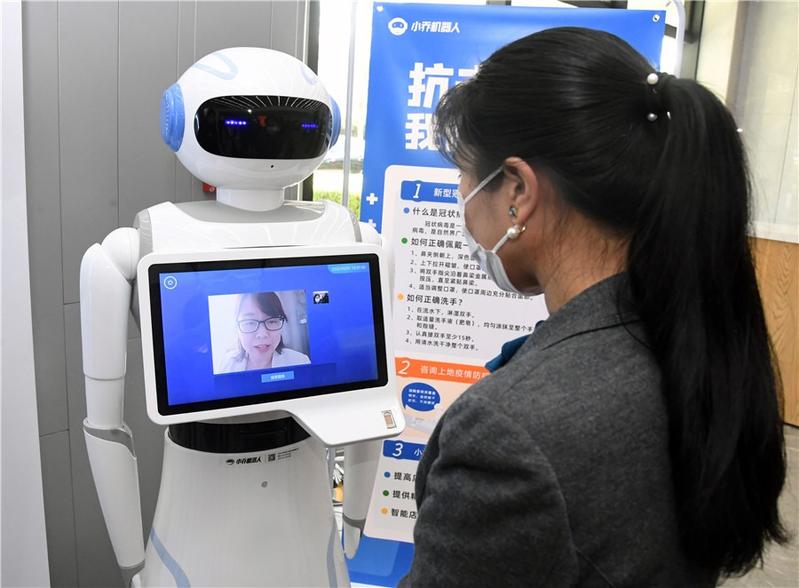 A woman communicates with a doctor with the aid of a robot in Beijing, April 1, 2020. (PHOTO / XINHUA)
A woman communicates with a doctor with the aid of a robot in Beijing, April 1, 2020. (PHOTO / XINHUA)
During the COVID-19 outbreak, 70.5 percent of Chinese executives experienced physical or mental health problems, with more now showing an interest in commercial medical insurance and internet-based healthcare, the latest report said.
The survey showed that when the epidemic broke out, 70.5 percent of Chinese executives experienced symptoms such as weariness, depression, anxiety and even mental exhaustion
The report issued by UK health insurance provider Bupa Global was based on a survey that collected feedback from 1,031 senior executives in China's first-and second-tier cities. They include business owners, company presidents, senior management members and other company officers at the director level or higher.
The survey showed that when the epidemic broke out, 70.5 percent of Chinese executives experienced symptoms such as weariness, depression, anxiety and even mental exhaustion.
But only 8.7 percent of those surveyed said they sought assistance from medical professionals such as a doctor, counselor or psychiatrist.
"Their anxiety mainly came from the uncertainty for the future and the fact that the situation was out of control," said Sheldon Kenton, CEO of Bupa Global.
As a result, long-term changes took place in their living habits.
READ MORE: Epidemic pushes online healthcare over tipping point
Bupa Global said the top five changes reported by executives include increased awareness of personal hygiene and improved personal hygiene habits, a healthier diet and more regular exercise. There is also increased vigilance in crowded places, improved mental health awareness and spending more time with family and friends.
As the government encourages people to purchase medical insurance, the demand for private medical insurance products from the general public is expected to trend upward.
The report said 78.8 percent of respondents stated they will purchase medical insurance again within the next 12 months, while 58 percent of senior executives were considering increasing their spending on such policies.
"We noticed the expanding health insurance market. People pay more attention to their health and well-being, as well as the capabilities of the local medical system. The demand for high-end medical insurance products and services is growing, and the purchase trend will be further revealed when the epidemic is over," said Kenton.
Also, the respondents showed increasing interest in online medical consultation services, stating that they wish to see a doctor at home, said the report.
Seeing the growing trend, Chinese enterprises are stepping up efforts in internet-based healthcare.
The company said remote healthcare via the internet hospital has become the norm. It has held nearly 10 long-distance multidisciplinary joint consultations on difficult cases and critically ill patients
Jianke.com, China's leading business-to-consumer pharmaceutical e-commerce platform, launched on July 10 an internet hospital in Tumxuk in the Xinjiang Uygur autonomous region.
The internet hospital enables patients in the region to realize medical consultations, drug purchases, chronic disease management and medical reimbursements online.
The company said remote healthcare via the internet hospital has become the norm. It has held nearly 10 long-distance multidisciplinary joint consultations on difficult cases and critically ill patients.
ALSO READ: Online platforms provide medical advice, front-line diagnosis and treatment
The service was widely praised by patients and their families. As online healthcare effectively lowers the possibility of cross contamination in physical hospitals, the increase in the number of doctors registered in its internet hospitals in the past six months reached 52.8 percent of the total registered doctors in the past years.
"The internet hospital fully plays the role of digital technology in internet plus medical insurance, and chronic disease management. It helps the medical insurance department to carry out intelligent supervision, and therefore slow down the growth of medical expenditures, and benefit the local people in the Xinjiang Uygur autonomous region," said Jianke CEO Xie Fangmin.
Kenton said that from the survey, the focus on long-term health by Chinese executives has been noticed, along with their growing demands for health insurance and internet healthcare.
In the future, Bupa will bring more varieties of health insurance products and services to meet the demand, he said.
At this time, it has introduced the Virtual Care app to its clients which provides access to medical advice anywhere in the world 24/7, in their own language.
"We have ensured that we provide cover for the coronavirus pandemic and have extended our Global Virtual Doctor consultation service to all Bupa Global clients around the world," said Kenton.


